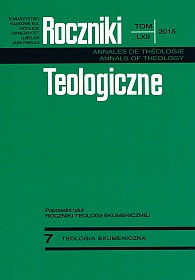Attitudes of the European Memory in the Ecumenical Perspective
Abstract
Human memory, in both individual and collective dimensions, is recognized as an inherent factor of identity since identity is declared to be a process of one’s reflection on his past and his future. Identity is thus developed in the constant interpretation of both individuals and communities on their history and their future. This is why a way of how past with the transfer of culture, social structure, norms and values is available for us, effects on our identity.
One of the ways to petrify a human memory is the culture of remembrance. It may be defined as the whole of undertakings, institutionalized or not, that contributes to strengthen both collective and individual memory about past experiences, in order to use these experiences to construct the future. It is embedded in the conviction that every distinctive society or community must build its identity on the one narrative line which encompasses the past, the present and the future. The culture of remembrance thus reveals itself in number of places of memory, monuments, museums, exhibitions, books, films, websites, memorial days, lectures. In light of how identity is defined, culture of remembrance must be seen as a strong factor of identity creating process.
Article discusses a way of how culture of remembrance is developed in order to build common European identity. Considering dialogue as an essential instrument of co-existence of European societies, the article displays the concept of dialogue provided by the World Council of Churches. Ecumenical teaching on dialogue must be received as a fruit of the long-term experience of the Christian Churches living in the various contexts, and as such as an useful tool to interpret the ways of how memory is revealed. Ecumenical perspective might be helpful to build the common European culture of remembrance.
References
Giddens A.: Nowoczesność i tożsamość. „Ja” i społeczeństwo w epoce późnej nowoczesności. Tłum. A. Szulżycka. Warszawa: PWN 2012.
Kopiec P.: The Culture of Remembrance. An Ecumenical Approach. „Studia Oecumenica” 13: 2013 s. 23-34.
Sztompka P.: Socjologia zmian społecznych. Kraków: Znak 2010.
http://www.goethe.de/ges/pok/pan/en7000483.htm (dostęp: 17.11.2013).
World Council of Churches: Ecumenical considerations for dialogue and relations with people of other religions: http://www.oikoumene.org/en/resources/documents/wcc-programmes/interreligious-dialogue-andcooperation/interreligious-trust-and-respect/ecumenical-considerations-for-dialogue-and-relations-with-people-of-other-religions (dostęp: 19.02.2015).
World Council of Churches: Guidelines on Dialogue with People of Living Faiths and Ideologies: http://www.oikoumene.org/en/resources/documents/wcc-programmes/interreligious-dialogue-and-cooperation/interreligious-trust-and-respect/en/resources/documents/wcc-programmes/interreligious-dialogue-and-cooperation/interreligious-trust-and-respect/guidelines-on-dialogue-with-people-of-living-faiths-and-ideologies (dostęp: 19.02.2015).
Copyright (c) 2015 Roczniki Teologiczne

This work is licensed under a Creative Commons Attribution-NonCommercial-NoDerivatives 4.0 International License.





